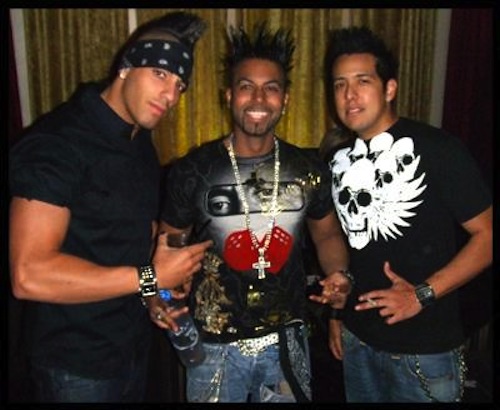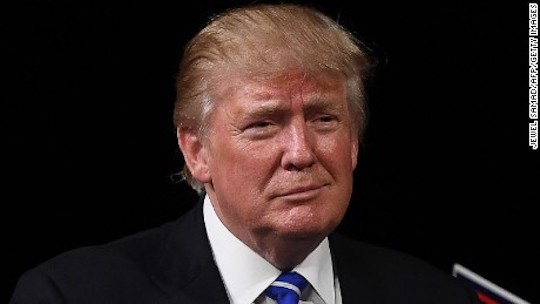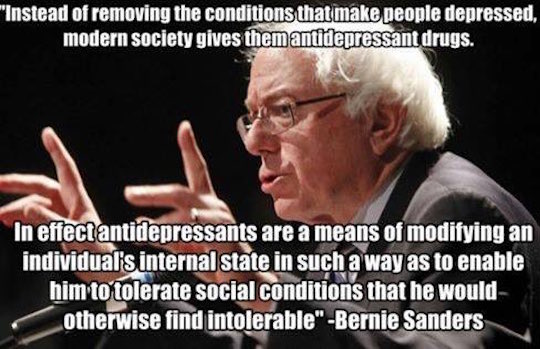Donald Trump is the best thing to happen to impressionists since at least George W. Bush, if not since Nixon himself. In addition to talking like a Jerky Boys character, his word choice is so consistently weird as to offer anyone who mimics him a readymade vocabulary: tremendous, (h)uge, great, believe me, trust me, you’ll see, I do not have a personality disorder, I’ll sue you for defamation, et cetera. Maybe none of the entries in this lexicon is as strange as “bigly,” a word Trump says—or people think he says—a lot. According to the New York Times and linguist Dr. Susan Lin, however, he’s actually saying “big league.” I thought we all agreed on that.
Tag Archives: quote
I was going to Google the Unabomber manifesto, but then I got scared
The quote on the picture above is not from Bernie Sanders. It’s from a manifesto by Ted Kaczynski, better known as the Unabomber. I ran across it on Twitter, where Anne Thériault observes with inscrutable emoji that it has been shared 11,000 times on Facebook. But just because the Unabomber said it, is it wrong? The Unabomber is definitely wrong in his position on mailing bombs to people. But his position on antidepressants, at least in this quote, echoes an idea from Sartre, who argued that depression is the only sane response to modern life. It’s worth thinking about the fact that millions of Americans must consume drugs to tolerate daily life. On the other hand, context matters. If the next sentence after this one in the Unabomber manifesto is “that’s why depressed people should be allowed to die,” we should probably withdraw our tentative concession that the murdering Luddite has a point. I was going to look it up, but then I realized that if I type “Unabomber manifesto full text” into Google, I’ll probably end up on a list.
What does it mean to support nullification?
Those impartial inquirers over at The Daily Beast have “caught” Joni Ernst, Republican candidate for Iowa’s Senate seat, saying that states can nullify federal laws. Really, she didn’t say that. She said that as a federal legislator, she would not pass the kind of laws that states would consider nullifying. She also said it last September, at the Iowa Faith and Freedom Coalition, while standing in front of a drum set. So grain of salt, but here she is:
You know we have talked about this at the state legislature before, nullification. But, bottom line is, as U.S. Senator why should we be passing laws that the states are considering nullifying? Bottom line: our legislators at the federal level should not be passing those laws. We’re right…we’ve gone 200-plus years of federal legislators going against the Tenth Amendment’s states’ rights. We are way overstepping bounds as federal legislators. So, bottom line, no we should not be passing laws as federal legislators—as senators or congressman—that the states would even consider nullifying. Bottom line.
If Ernst wants to pay my exorbitant consulting fee, I can think of a phrase that she uses too much. Also, let’s take a second to talk about nullification, which is a hot topic in American politics for the first time since 1832.
Why won’t Rumsfeld admit he is bullshit?
Donald Rumsfeld is closely associated with two memorable quotations. The first came during his evasion of a question about how (subtext: if) he knew that Iraq had weapons of mass destruction, when he said “absence of evidence is not evidence of absence, or vice versa.” It was an infuriating statement, partly because the vice-versa version is dumb but mostly because Carl Sagan used to say it about the existence of extraterrestrial life somewhere in the vast universe, not about a specific place where we had sent UN weapons inspectors. The second classic Rumsfeld quote is the infamous “known knowns” disquisition, in which Rumsfeld responds to a question partly by attacking the very concept of knowledge. It provided the title for Errol Morris’s new documentary The Unknown Known, which he will be very happy to discuss with your news outlet.
Regarding shame
 As a lazy, dishonest person, I appreciate the value of shame. Take this blog: were it not for the literally several of you who expect a post each weekday, I would probably wake up early and excuse myself from writing almost every morning. Fortunately, I find time in the day to do that anyway, but my point is that shame is a powerful motivator—for me, at least, and I suspect for a lot of other people, too. One of the aspects of conservative orthodoxy I actually agree with is that our contemporary culture exerts dangerously low amounts of shame. I totally disagree with conservatives about where that shame should be placed; we still exert way too much shame on gay people and immigrants, for example. That’s valuable shame that could be more effectively directed elsewhere. Maybe, as Thomas Edsall suggests in the Times, we could redirect our shame at people who make obviously false and/or misleading statements to the general public. Earlier generations called such statements lies.
As a lazy, dishonest person, I appreciate the value of shame. Take this blog: were it not for the literally several of you who expect a post each weekday, I would probably wake up early and excuse myself from writing almost every morning. Fortunately, I find time in the day to do that anyway, but my point is that shame is a powerful motivator—for me, at least, and I suspect for a lot of other people, too. One of the aspects of conservative orthodoxy I actually agree with is that our contemporary culture exerts dangerously low amounts of shame. I totally disagree with conservatives about where that shame should be placed; we still exert way too much shame on gay people and immigrants, for example. That’s valuable shame that could be more effectively directed elsewhere. Maybe, as Thomas Edsall suggests in the Times, we could redirect our shame at people who make obviously false and/or misleading statements to the general public. Earlier generations called such statements lies.




